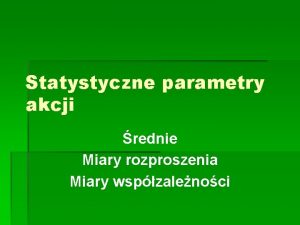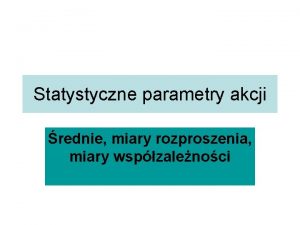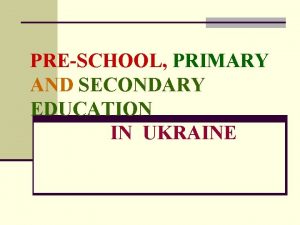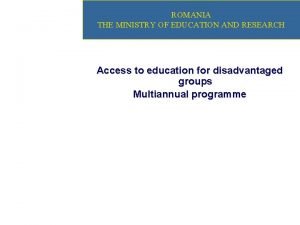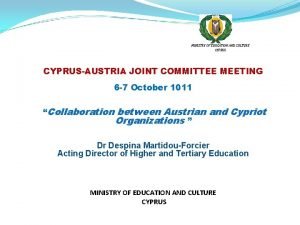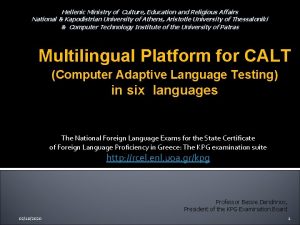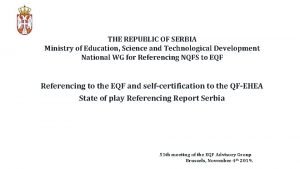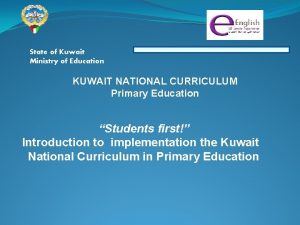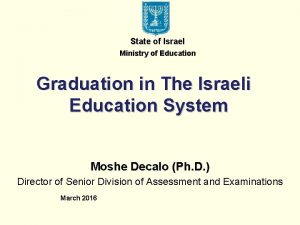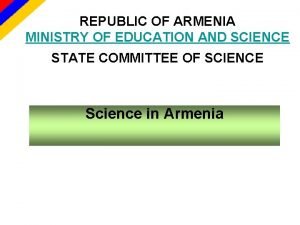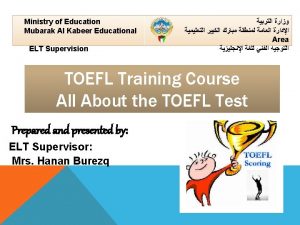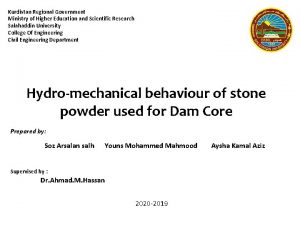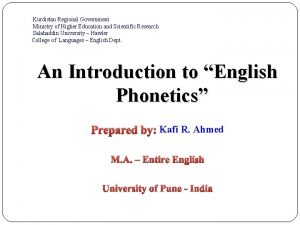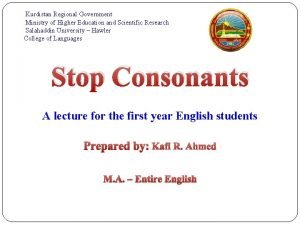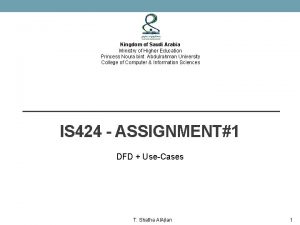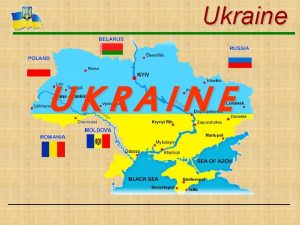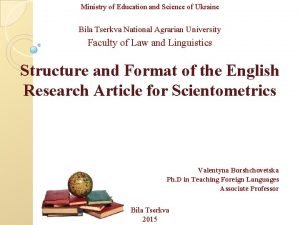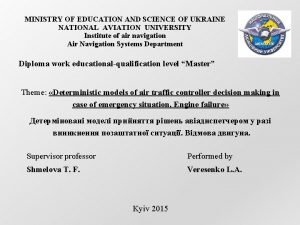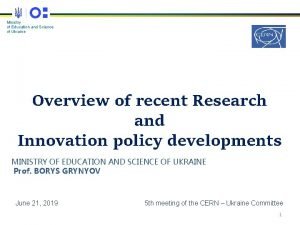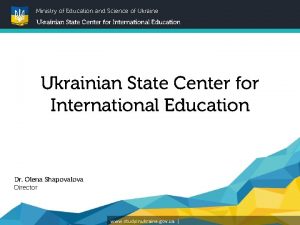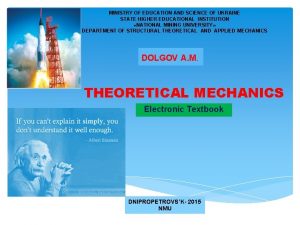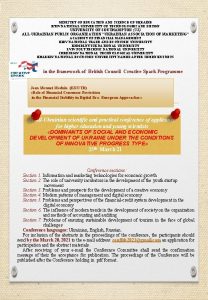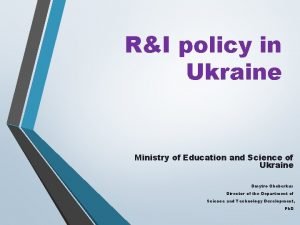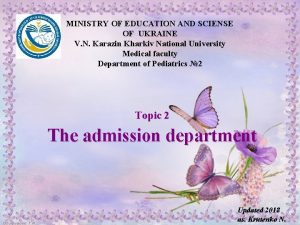Ministry of education and science of Ukraine Sumy





















- Slides: 21

Ministry of education and science of Ukraine Sumy state University Faculty of foreign Philology and social communications Department of German Philology Bachelor's work on the topic: “Formation of lexical skills at different stages of English language training” Performed: Student of the group PR 62/2 Ikonopystseva Maria scientific adviser: Kobyakova I. К.

The relevance of the topic lies in the fact that based on the study of the chosen topic, analysis and comparison with early developments, it is possible to identify effective means of using varieties of vizualization in creating English-language lexical at different stages of training. The object of the research is a variety of visualizations, ways to use them during the formation of vocabulary at different stages of English language training. Subject of analysis: the feasibility and effectiveness of using visualizations as a separate method and interaction with others at the stage of familiarization and automation of working with lexical.

The purpose of this work is to study the peculiarities of the formation of English-language lexical competence, which determines the lexical correctness of speech, what determines specifically-oriented lexical literacy at different stages of training. The goal requires addressing the following issues: - to study the content and features of the formation of English-language professionally-oriented lexical at different stages of training; - to note the methodological advantages of using lexical skills in the formation of lexical Literacy at different stages of teaching. The practical significance of the results is determined by the possibility of using materials for the development of practical classes or creating a course of lectures, methodological recommendations for the use of modern teaching methods in the process of teaching English at different stages. The proposed methods and practical recommendations concerning the formation of lexical competence skills can be useful for teachers and students of different age groups who want to improve their English language skills.

For the purpose of more effective teaching, as well as the ratio of methods and needs, the mechanism of mastering lexical material is divided into the following stages: 1) familiarization to new lexical units; 2) automation of work with new lexical, where there is an automation of word forms, phrases, sentences, as well as more phrasal automation (monological or dialogical unity).

Directed learning of vocabulary consists of the following stages: 1) "choral" repetition of words and phrases; 2) fixing a new lexical to the dictionary; 3) "choral" shouting of new material with interpretation of its meaning; 4) doing homework: using a dictionary, translate words and phrases, write them down with transcription in the dictionary, remember the definitions; 5) complete the task in writing - to consolidate what you have already learned; 6) control the assimilation of the material-work in pairs or individually; 7) add new lexical to the reading process.

Content and formation of lexical competence "Lexical competence" is the lexical knowledge and ability to use the lexical stock in speech: oral (listening conversation) and written (writing, reading). The term "competence" comes from the Latin “ competentia “ (meeting, agreement), " competere " (approach, match) and generally means entering into sufficient skills and knowledge for a certain productive work. This concept is usually used in the works of scientists who study various types of linguistics, theory, and methodology of language teaching, and "linguistic (speech) competence" and "communicative competence“ are more often used to indicate the term. The expression " linguistic competence "was first used by N. Khomskу, it was used as knowledge of the basics of the language, and "communicative competence" was first used by D. Haymes, which means knowledge that provides an opportunity to carry out functionally directed speech communication. "Lexical competence", as a component of "communicative competence", is stated in the "pan-European Recommendations on language education" and means " knowledge and ability to use a language lexical. »

There are three main stages in the formation of English language lexical competence: - At the first stage, the receptive reproductive tasks for recognition, imitation, and naming of lexical units are solved. It is appropriate to use non -communicative, fully manageable tasks with acoustic or visual typical images that can hint at the interpretation of a word or phrase, and thus both contribute to the primary consolidation of the lexis, and involve other aspects of the language (grammar, phonetics). - The tasks of the second stage are aimed at working out the functioning of the lexical skill: choosing a lexical unit according to the idea of the utterance, combining words and phrases in semantics, situational substitutions. Such tasks are individual, conditionally communicative and to a certain extent manageable, they include language tasks and situations that provide interactivity and the ability to use visual and auditory semantic supports.

(continuation ) - At the third stage, lexical skills are improved. With sufficient preparation and successful completion of the previous stages, exercises are performed to include vocabulary in simple and complex statements, to ensure the transition from improving lexical skills to developing speech skills. All these tasks are communicative, with a minimum of management, for General and individual work. Items should include vocal exercises and circumstances of the broadcast. In other words, it is necessary to create favorable conditions for the conscious assimilation of English-language vocabulary when performing simple "technical" exercises of a professional direction, using educational communications on the basis of three stages of lexical competence formation according to the rule "from simple to complex" and developing tasks related to each stage of training.

The purpose of forming lexical competence is the legality of using such principles in the development of English language lexical material: - differential approach to the study of lexical material; - individual account of the age category and other characteristics of students; - availability of training; - communicative and game purposefulness of the educational process; - high intensity and activity of the first stage of training.

Intensive training can be facilitated by the following methods and techniques: - training methods with the inclusion of suggestopedia, which are aimed first, at the formation of lexical competence and pronounced culture; second, at beating the rhythm of phrases and phrases that are pronounced, different variations of the voice, movements in time, the use of background melodies with a specific rhythm to destroy the stereotypes of the sound of the native language; - techniques for simultaneous involvement in moving games of all students divided into groups; - use of game forms during training and practical communication: competitions, contests for cognitive or communicative purposes (crosswords), dramatization (poetry), play roles; - tools that require the creation of projects at the end of training, they are better used for independent study.

The formation of English-language lexical competence should be created with the participation of: - careful selection of authentic literature and learned materials of socio-cultural direction; - change of situational behavior and speech exercises that will help international communication in certain areas of functioning; - performing a set of linguistic exercises using speech or visual clarity during receptive reproductive training to automate sociolinguistic skills and abilities; - creating a personal and communicative approach to learning during communication in order to acquire their own cultural and social communication skills; - - the use of a clear algorithm for the assimilation of lexical material for the formation of appropriate sociolinguistic competence

Features of work at the initial stage of training The main task in primary school (grades 1/2 -4) is the formation of basic lexical material and skills necessary for further improvement of English-language communicative competence. At this stage, the formation of receptive and reproductive skills in the scope of these aspects and circumstances, according to the age characteristics of students and their priorities, based on the use of speech samples. To do this, we recommend "choral" study, lexical games, subject and visual clarity, as well as written exercises. The level of English language proficiency at the end of the fourth year of study should correspond to A 1, according to the"pan-European Recommendations for language education: study, teaching, assessment".

Features of work at the middle stage of training This stage begins with a systematic and consistent study of authentic educational literature, which contributes to the mastery of communication. The volume of vocabulary, especially of a socio-cultural nature, increases for the formation of sociolinguistic competence. Training topics include a variety of areas of knowledge, inter-subject relationships or situations from your own life experience. The share of independent training of students increases, speech situations are used that create almost real conditions for communication. At the end of the ninth grade, the English language proficiency level should reach A 2+, in accordance with the"pan-European Recommendations for language education: study, teaching, assessment".

Features of work at the senior stage of training In grades 10 -11 (high school), the speech experience acquired in the previous stages is suitable for generalization and systematization. Methods and varieties of the educational process are even closer to the real conditions of communication. Students actively use creative, group, project, and interactive work options. The content of education is chosen for the appropriate training profile, with professionallydirected vocabulary, and the active formation of a passive lexical minimum continues during independent reading. The volume of independent study of new lexical material increases, and the skill of using dictionaries improves. The level of English language proficiency at the end of the eleventh grade should reach the B 1+ level, in accordance with the"pan-European Recommendations for language education: study, teaching, assessment".

Basic concepts, principles, and stages of lexical unit formation The program standards are reproduced in the lexical minimum, which is divided into active and passive. Сriteria for selecting lexical minimums: 1. Compatibility 2. 2. Semantic significance of the activity and the desired topic 3. 3. Stylistic unlimited Additional criteria: 1. Frequency 2. 2. Ambiguity 3. 3. Possibility of word formation and drill function Active and passive vocabulary of students is called the real (existing) vocabulary minimum. It is the basis for the formation of a potential dictionary.

There are two groups of semantics methods (perception and understanding of new lexical units): Transferable: Non-translated: - single-word translation ; - verbose translation ); - one-time translation; - explanation of the meaning and / or vocabulary in the native language). 1) visual semantics-demonstration of drawings, objects, gestures; 2) speech semantics, based on: - context, illustrative sentence: - сomparison of an unknown word with already defined ones-using antonyms, less often synonyms; - definitions method-the meaning of the word behind the dictionary; - using a word structure: prefix or suffixation, changing one part of speech to another (conversion); - interpretation of the meaning of a lexical unit based on its similarity to the native language or international lexis; - select a semantic series of words that can be combined into groups.

Difficulties in mastering English language lexical units are as follows: 1) the problem with determining the form of a lexical unitsound, graphic, structural; 2) problem with translating a lexical unit; 3) incorrect combination of a lexical unit with another vocabulary, peculiarities of its use in speech To avoid possible difficulties, аny of the methods of semantics can be effectively and appropriately implemented in practice using modern “U-learning " tools: mobile gadgets or computers with Internet support.

There are interactive methods for effective formation of lexical competence: 1. “Mental maps” - will be useful in English classes in primary school, because it will allow you to create convenient and accessible to the perception of interesting "intellectual cobwebs" on the topic; 2. “Quiz” - have a wide variety of choices and combine the following questions: "is it true or not? ", filling in "gaps"; they act as an "indispensable assistant" to the teacher, because they create conditions for freely conducting training individually and in groups to consolidate, as well as control and evaluate knowledge; 3. “Flashcards” - provide a question and answer in the work, they are good for fixing the received material on the topic, in particular lexical units;

4. “Presentation” - allows you to provide educational material

Conclusion: As a result of this work, it should be noted that lexical competence is an integral component of English-language communicative competence, the purpose of which is to form the ability to successfully understand contact native speakers, according to the requirements of cultural traditions in terms of direct or indirect interaction. Based on the level of language proficiency in accordance with the "pan. European Recommendations on language education: study, teaching, assessment", we believe that an effective process of learning vocabulary and forming lexical competence should be a consistent, logical and important component of the formation of English-language communicative competence of students at various stages of training. Modern aspects of teaching English at different stages allow you to diversify first, by working through the tasks with the help of teacher's instructions, traditional authentic literature: dictionaries, manuals, reference books, and secondly, it makes sense to prepare and implement in the educational process exercises based on interactive technologies (creating mental maps, tests, presentations, etc. ) and electronic resources "E-learning” and" M-learning”, playlists, Websites, chats, email addresses, social sites, training online – portals, You. Tube video presentations and electronic dictionaries.

 Miara rozproszenia
Miara rozproszenia Wariancja sumy
Wariancja sumy Zredukuj wyrazy podobne
Zredukuj wyrazy podobne Ministry of infrastructure (ukraine)
Ministry of infrastructure (ukraine) Ministry of education and science of the russian federation
Ministry of education and science of the russian federation Science and technology center ukraine
Science and technology center ukraine Nursery school ukraine
Nursery school ukraine Ministry of education romania
Ministry of education romania Ministry of education and culture cyprus
Ministry of education and culture cyprus Hellenic ministry of education and religious affairs
Hellenic ministry of education and religious affairs Ministry of education romania
Ministry of education romania My favorite subject is english
My favorite subject is english Ministry of education serbia
Ministry of education serbia Ministry of education kuwait
Ministry of education kuwait Matriculation certificate
Matriculation certificate Ministry of education armenia
Ministry of education armenia Ministry of higher education (afghanistan)
Ministry of higher education (afghanistan) Mubarak al-kabeer educational zone
Mubarak al-kabeer educational zone Kurdistan
Kurdistan Ministry of higher education kurdistan
Ministry of higher education kurdistan Kurdistan higher education
Kurdistan higher education Ministry of higher education saudi arabia
Ministry of higher education saudi arabia
